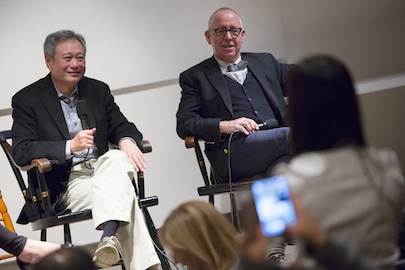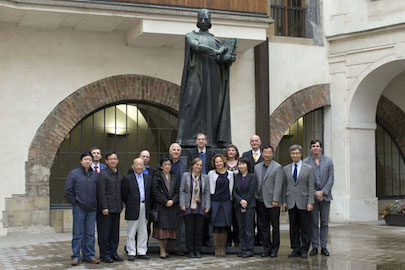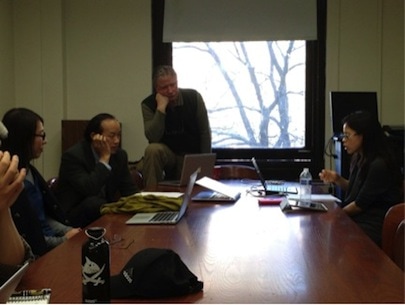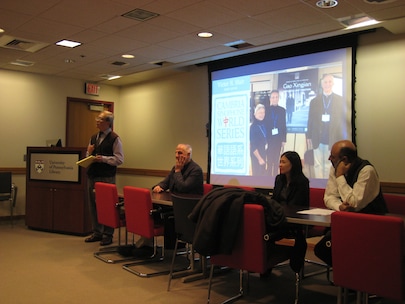19th Annual Conference, North American Taiwan Studies Association (NATSA), University of California-Santa Barbara The North American Taiwan Studies Association (NATSA) is a 501(c) (3) nonprofit organization established and operated by overseas Taiwanese students and North American scholars interested in studying Taiwan. The 19th NATSA Conference was successfully completed at the University of California-Santa Barbara on June 21-22, 2013. The conference theme, Taiwan in Theory, challenged scholars to explore issues that will place Taiwan at the forefront of theory. In her keynote speech, Professor Shu-mei Shih (UCLA) responded to the conference theme by provocatively claiming that, “There is no theory in Taiwan.” She provided exemplary literary texts evidencing Taiwan’s constitutive role in world history, and then explained how the theoretical framing of “Taiwan” is set by Americanism, settler colonialism, and recent theories of imperialism. In her conclusion, she suggested that Taiwan’s experiences could make novel theoretical contributions. In his concluding remarks, Professor Hsing-Huang Michael Hsiao (National Taiwan University) offered reflections on the conference, its multi-disciplinarity, and opportunities for thematic cross-fertilization. He discussed the importance of Taiwan in History (from the shadows to legitimate history), Taiwan in Reality (from dependence to a paradigmatic reality), and Taiwan in Theory (from theory takers to theory makers). Taiwan Studies, he explained, has a dual-character as an area studies for scholars outside Taiwan and an inter-disciplinary field for Taiwanese scholars. There were around ninety conference attendees in total from 47 different academic institutions all around the world, including universities in Australia, Canada, China, Czech, Germany, Japan, Taiwan and United States; among them, more than 40 were faculty-level participants (see Appendix 2 for figures). Overall, the conference inspired many spirited debates that revealed the diverse approaches and productive tensions surrounding the meaning and value of theory and how Taiwan contributes, or can contribute to it. Sinophone Literature and Cinema, 12th Annual Junior Scholars' Conference on Sinology, National Chung Hsing University “Sinophone Literature and Cinema: the 12th International Junior Scholars Conference on Sinology” was held at National Chung Hsing University, Taichung, Taiwan on July 30-31, 2013. The conference was hosted by both the Graduate Institute of Taiwan Literature and Transnational Cultural Studies, National Chung Hsing University (Taiwan) and the Department of East Asian Languages and Civilizations, Harvard University (USA). It received generous support from CCK-IUC, the National Science Council of Taiwan, the Ministry of Education of Taiwan, NCHU College of Liberal Arts, and the Research Center for the Humanities and Social Sciences at NCHU. Focusing on the theme of “Sinophone Literature and Cinema,” the conference aimed to provide new directions in Sinology by theoretically challenging the nation-state as the mechanism through which culture and politics are imagined and by dialectically re-examining similarities and differences between concepts, such as Chinese, China, Taiwan, overseas Chinese, and Chinese American. There were more than two hundred participants from twelve countries in the two-day conference. Forty oral presentations were given by 19 presenters from Taiwan and 21 from other countries. Two roundtable discussions on Sinophone Studies in Europe and East Asia were moderated by scholars from the UK, Germany, the Czech Republic, Korea, Hong Kong and Taiwan. The conference was very pleased to invite Professor David Der-wei Wang (Harvard University) to give a keynote speech entitled “The Approaches and the Problematic of Sinophone Studies.” Ang Lee and the Art of Transnational Cinema, Harvard University An afternoon symposium on “Ang Lee and the Art of Transnational Cinema” was held at Harvard University on October 25, 2013 in conjunction with a film retrospective entitled “Ang Lee, Close Up” at the Harvard Film Archive (HFA) and an Ang Lee film festival at Wellesley College. Ang Lee and his long-time collaborator, James Schamus (Columbia University), were both present at the event. The symposium was co-organized by David Der-wei Wang (Harvard University) and Jie Li (Harvard University), and was co-sponsored by the Fairbank Center for Chinese Studies, The Harvard Fim Archive, the Department of East Asian Languages and Civilizations, and the Taipei Economic and Culture Office. Director Ang Lee and Professor James Schamus (Columbia University) take questions from the audience at Harvard University, October 25, 2013. Photo credit: Stepanie Mitchell/Harvard Staff Photographer. The symposium began with brief opening remarks by Mark Elliott (Fairbank Center Director, Harvard University), David Der-wei Wang, and Ang Lee himself, followed by the screening of a highlight reel of Ang Lee’s work composed by Jie Li and Benny Schaeffer (PhD candidate, Harvard University). The first panel included four scholarly reflections on Ang Lee’s work, including Christina Klein (Boston College” on “The Diasporic Dimensions of Ang Lee’s Cinema,” Jerome Silbergeld (Princeton University) on “Ang Lee’s America,” Chien-hsin Tsai (University of Texas – Austin) on “Ang Lee’s Taiwan,” and Eugene Wang (Harvard University) on “What is the Caution in Lust, Caution?” While each offering a different perspective, these papers resonated with one another in their rumination on Ang Lee’s use of sensory perception in his films, especially his thoughtful use of color and invocation of taste and smell in his frequent depictions of culinary activities. The second half of the symposium featured an intimate dialogue between Eileen Chow (Duke University), Ang Lee, and screenwriter James Schamus (Columbia University). Animated question-and-answer sessions followed both the academic panel and the dialogue, and 275-seat auditorium was filled to capacity. More information on related events can be found online at: http://hcl.harvard.edu/hfa/films/2013octdec/lee.html and http://www.baaff.org/. Uncertain Boundaries, Fluid Concepts, Changing Imagination International Symposium, Charles University An international symposium on “Uncertain Boundaries, Fluid Concepts, Changing Imagination” was held at Charles University, Prague on November 14-17. The symposium was co-sponsored by CCK International Sinological Center at Charles University and CCK Inter University Center for Sinology at Harvard, under the leadership of Professor Olga Lomoá at Charles. More than fifty scholars, from twelve countries and Sinological communities (The Czech Republic, Slovakia, Slovenia, Italy, Germany, Poland, Russia, France, USA, Mainland China, Taiwan, Hong Kong) attended the symposium. The scholars from the Unites States were Victor Mair, Ban Wang, Carlos Rojas, Jing Tsu, and David Wang. Sixteen papers were presented on a wide range of issues on sinological subjects and methodologies. Dr. Anne Cheng of Collèege de France gave a keynote speech on Philosophy and the French Invention of Sinology”; Professor Victor Mair of the University Pennsylvania a second keynote speech on “Sinology, Chinese Studies, Orientalism, and Beyond.” The symposium was most productive and a follow up symposium is expected to take place at Harvard in two years. U.S.-based scholars participating in the symposium on "Uncertain Boundaries, Fluid Concepts, Changing Imagination" included Professors Victor Mair(University of Pennsylvania), Carlos Rojas (Duke University), Ban Wang (Stanford University), and David Der-wei Wang (Harvard University). Early China Seminar, Columbia University The Early China Seminar at Columbia University convened on October 12 and November 16, 2013. During the first meeting, two reports were presented. Professor David Pankenier (Institute for Advanced Study) presented a paper “Wherefore the Star-Crossed Lovers Weaving Maid and Ox-herd?” in which he analyzed the traditional Chinese narrative about the Weaving Maid and Ox-herd and its relation to the pan-Eurasian weaving mythos that supposedly goes back to the Paleolithic times of Eurasian migrations. He argued that the story of Weaving Maid might have arrived from the very archaic mythic complex that predates these migrations. In his report “A New Hypothesis on the Techniques of Casting Western Zhou Bronze Inscriptions”, Professor Li Feng (Columbia University) analyzed the technical aspects of casting Western Zhou bronze inscriptions, and addressed the problem of establishing authenticity of the inscribed vessels. His reconstruction of the casting techniques allows to account for features of some of the Western Zhou bronze vessels that remained unexplained under the previous hypotheses. Professor Cai Liang with members of the Early China Seminar at Columbia University on November 16, 2013. The second meeting focused on the issues in the history and linguistics of the Han era. First, Professor Cai Liang (University of Arkansas) in her paper “Witchcraft and the Rise of the First Confucian Empire” explored the transformation of the Former Han elite during the reigns of Emperors Wu, Zhao, Xuan, and Yuan (second half of the second century – first century B.C.). She applied new quantitative methodology to the biographical material in the Shiji and the Hanshu to demonstrate that a dramatic upheaval occurred in the end of Emperor Wu’s long reign and was associated with the so-called witchcraft affair. In his report “Bān Gù’s Tetrasyllabic Verse and its Place in the Evolution of the Form”, David Prager Branner (Institute for Advanced Study) analyzed Xuzhuan xia, the second half of the last chapter of the Hanshu. This is a poem composed by the Hanshu author, Ban Gu, which summarizes the details and moral lessons to be taken from the book. He argued that the purposeful avoidance of the so-called shangwei transgression (non-rhyming feet in the same tone as that of the rhyme) in this poem reveals that the origin of Shen Yue’s (441-513) prosodic theory, which some theorize to have been inspired by his familiarity with Sanskrit, could be traced back to Han times. This conclusion calls for revision of current ideas about the formation of prosodic practice in China. Modern China Seminar, University of Pennsylvania On November 21, 2013, the Modern China Seminar at the University of Pennsylvania presented its first public lecture for the academic year 2013-2014. Professor Ping-hui Liao, Chuan Lyu Endowed Chair Professor in Taiwan Studies (University of California, San Diego), delivered a talk, “Sinophone Writings: Prospects and Problems.” The talk examined recent critical debates around the Sinophone discourse and considered how this notion opened up alternative perspectives to address the hybrid, expressive cultures that have been developed across a rich diversity of Chinese speaking communities. Professor Liao’s talk was followed by a round table discussion featuring three panelists: Victor H. Mair, Professor of Chinese Language and Literature, Suvir Kaul, A. M. Rosenthal Professor of English, and Xiaojue Wang, Assistant Professor of Modern Chinese Literature at the University of Pennsylvania. A diverse range of perspectives was brought to bear on issues of the Sinophone studies, minor literature, Sinitic-language cultures, literary canonization, decolonization and nationalism, diaspora, and comparative literature. The lecture and the round table drew a large number of undergraduate, graduate students, and faculty, who participated enthusiastically in the discussion. The event was featured on the Art and Culture Initiative Online Magazine at the University of Pennsylvania. Professor Ping-hui Liao delivers a talk for the Modern China Seminar
at the University of Pennsylvania on November 21, 2013. Comments are closed.
|
Archives
September 2020
Categories |





 RSS Feed
RSS Feed